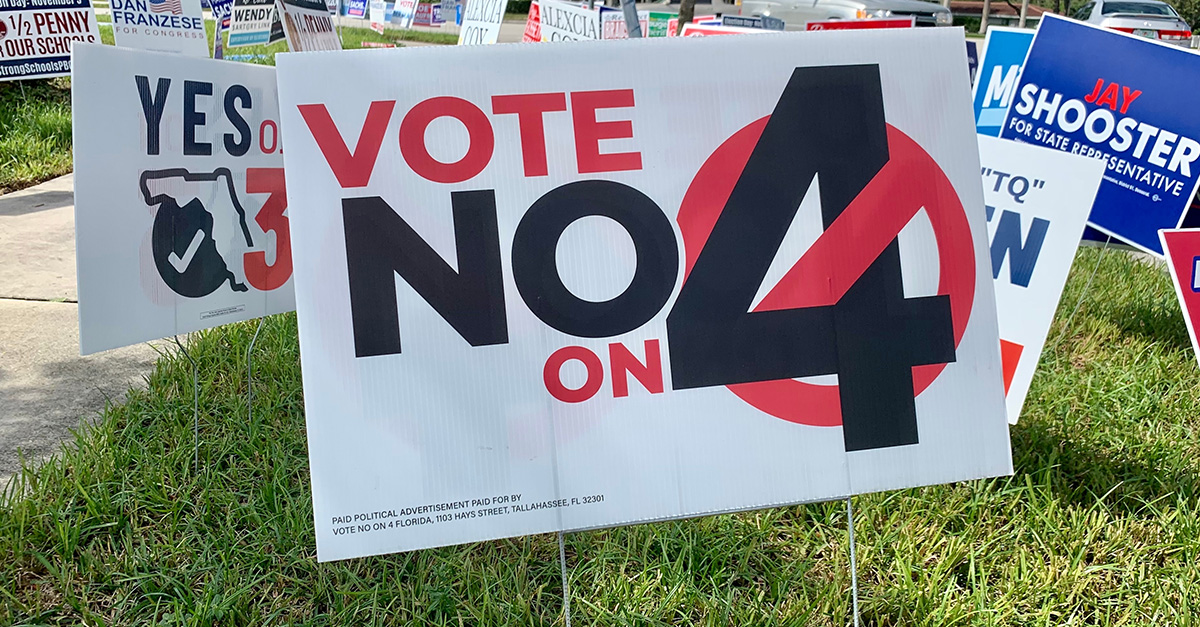


Get a free copy of Parental Rights & Education when you subscribe to our newsletter!

For the first time, pro-lifers prevailed in a major ballot measure, but there is little time to celebrate as the “enemy of our souls will not give up” and “will come back with a vengeance.”
Phew! That was close.
The constitutional amendment known as Amendment 4 would have cemented abortion on demand at all stages, erased parental consent for minors, and opened the door to taxpayer-funded abortions across the Sunshine State.
It didn’t happen, though. Amendment 4 failed — but barely. The measure earned the support of 57 percent of voters but fell short of the 60 percent required for passage.
That’s both good and bad news. The good news? Florida’s current heartbeat law remains intact. This law prohibits abortions after six weeks, with exceptions for rape, incest, human trafficking, or when the mother’s life is at risk.
This is a win for the pro-life movement, especially since the abortion cartel poured an eye-popping $110 million into getting the amendment across the finish line — more than what was spent on Florida’s entire U.S. Senate race between Rick Scott and his challenger, Debbie Mucarsel-Powell. Florida became ground zero for abortion backers hoping to make the state the next red domino to fall.
“The abortion industry is a pro-death cult,” Lynda Bell, president of Florida Right to Life, told the Freedom Center. “It’s a billionaire industry. It’s about money, not rights.”
For now, that money train screeches to a halt — at least in Florida. But don’t get comfortable, warns Pastor Ernie Rivera, president and co-founder of the Protect Our Children Project, a Tampa-based nonprofit. “The pro-life movement in Florida faces an uphill battle to effectively communicate the sanctity of life and influence public opinion in a culture that is increasingly secularized.”
Pastor Rivera underscored that a significant number of Floridians voted for abortion with virtually no restrictions. “Even though it fell short of the required 60% threshold, the 57% majority reflects a cultural shift and a growing divide on moral and ethical issues,” he said. “Too many voters either do not fully understand the issue or are influenced by cultural narratives prioritizing personal autonomy over moral responsibility.”
Lynda Bell shares his concern over the 57 percent “Yes” vote but chalks some of it up to the massive spending disparity. “It shows what can be done when you outspend your opponent by $100 million,” she said.
Bell didn’t stop there. She slammed the media for its blatant bias, pointing to the constant stream of lies about Florida’s heartbeat law. She also highlighted how the media not only misrepresented the law’s existing exceptions but ignored the radical nature of Amendment 4. “We were fighting both the abortion advocates and the media.”
Bell is absolutely right. Conservatives have long understood that legacy media isn’t interested in fair coverage. Instead, we end up squaring off against two ideological foes: activists and leftist reporters pretending to be straight shooters.
But here’s where it gets interesting: Despite being outspent and attacked by the media, Florida’s pro-life coalition won.
How?
Pastor Rivera credits the mobilization of churches, community leaders, and individuals. He noted that one of the most resonant voices came from Gov. Ron DeSantis and First Lady Casey DeSantis. “If other governors followed their lead, I’m sure there would be more positive results nationwide,” he said.
Bell agreed, adding that the abortion industry underestimated the Church. Even without deep pockets, pastors rallied with grassroots campaigns to educate voters. “You need people when you don’t have the money, and we had the volunteers and the enthusiasm on our side,” she said.
A key piece of their strategy was bringing together 21 like-minded conservative organizations, all united with one purpose: defeating Amendment 4. The strategy involved distributing thousands of pamphlets, running phone banks, sending text messages, and going door to door to persuade voters. “Everyone was on the same page, repeating the same message,” Bell said proudly. What stands out further is that conservative and Christian groups — often notorious for territorial squabbles — set aside their egos and worked as a cohesive team. “We all shared the credit.”
For seven months, Bell crisscrossed Florida, visiting churches and warning anyone who would listen about the abortion lobby’s deceptive tactics. And although she, too, was disappointed that 57 percent of voters backed the constitutional amendment, she remains optimistic that people will come around once they realize they were lied to. She emphasized that Florida’s heartbeat law includes a dedicated fund of $25 million to support crisis pregnancies, a fact most people don’t know about yet.
“We’re only two years removed from Roe’s downfall,” Bell observed. “The dust is still settling.”
So, while pro-lifers can breathe a temporary sigh of relief, now isn’t the time to relax. The next fight is inevitable.
Pastor Rivera stressed the importance of expanding the pro-life alliance by bringing in more faith-based organizations, civic groups, and medical professionals, combined with personalized storytelling to highlight the real-life dangers of abortion.
This approach, he argued, will help amplify the message, reach broader audiences, and counter the insidious disinformation spread by the political left.
“The enemy of our souls will not give up, and we know they will come back with a vengeance.”
If you like this article and other content that helps you apply a biblical worldview to today’s politics and culture, consider making a donation here.